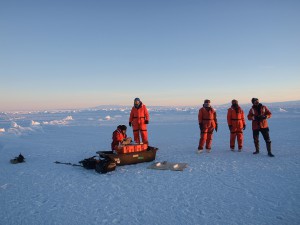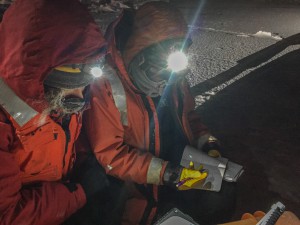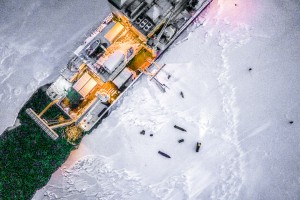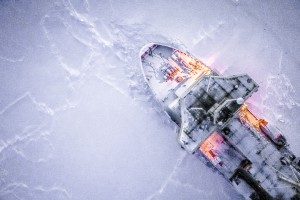We’ve posted a lot about the cool (pun) science and life as a scientist aboard the NBP, but the science party represents less than half of the crew aboard the NBP (actually, we’re called guests). Edison Chouest Offshore (ECO), the owner and operator of the NBP, does the majority of its work in the oil service industry. This means servicing drilling platforms and other infrastructure in the Gulf of Mexico, the North Sea, and Alaska. In this respect, the NBP and the LMG icebreakers are somewhat unique in the ECO fleet. ECO is based in Louisiana, and a lot of the crew live in states that have a coastline on the Gulf of Mexico. This post is about life afloat on the NBP from two members of the NBP crew – AB Jordy Thomas and Chef Nena Donaldson, told by interview.
Nena Donaldson, is a chef and certified in food service preparation. Nena was born in Jamaica, grew up in New York, but now she lives in Florida. She has 6 kids and 5 grandkids. Nena used to work for the Navy. She has a Bachelor’s in legal assistance and a Masters’ degree in criminal justice, but she says that cooking has always been her calling. She started working for ECO as an AB or “able bodied” sea person, but quickly moved from AB to the galley. This is also Nena’s first trip aboard the NBP and to Antarctica. Normally, she is chef aboard boats that home port in New Orleans, LA.
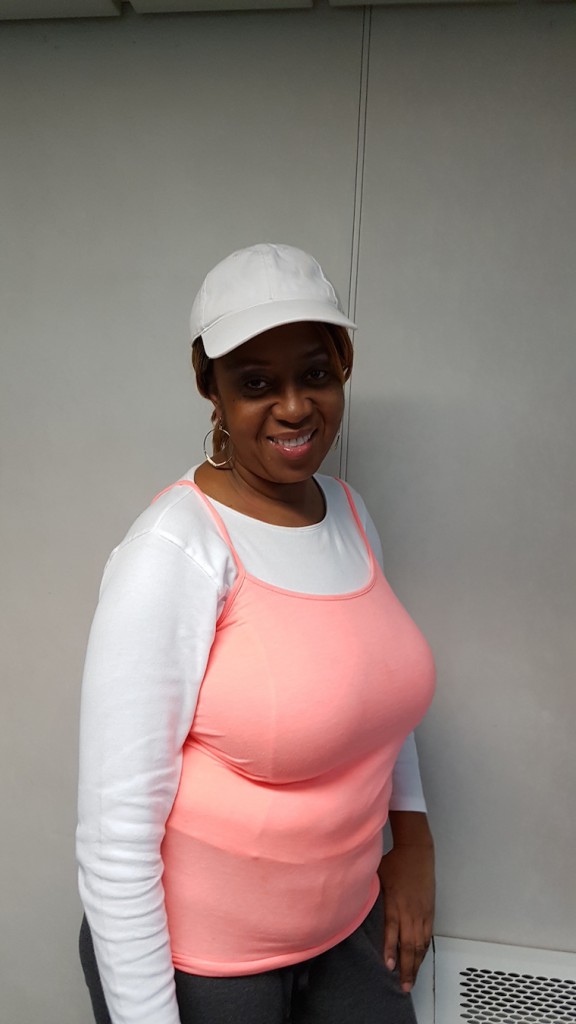
Nena Donaldson, one of the chefs aboard the Nathaniel B. Palmer.
B: How did you decide to become a chef?
N: I grew up in a home where lots of people cook. My younger sister owns a restaurant. The whole family cooks. I think we each have a gift and mine is definitely cooking. Most of the time it’s rewarding.
B: It must be hard to come up with new ideas for things to cook every day for 65 days, especially as the ingredients start to dwindle.
N: It’s not that bad, but I definitely think about it all the time. When I lay down at night I’m brainstorming about what I might do the next day. Sometimes I go in the galley thinking I’m going to cook one thing, and then I change my mind at the last minute. I cook a lot of different food. People don’t expect it, but I like to cook latin food, tacos, chicken, taco soup, home made salsa. But you also have to work with what you have, and that’s what we do.
B: What is your daily routine like?
N: My shift begins at mid-day and I start to prepare dinner. I always prepare some of the same basics and then I mix in a few other things. Beans and soup are always on the menu; it could be vegetable or cream of broccoli, black beans, pinto beans. Then I always prepare two kinds of meat because I know that not everyone eats red meat. I also like to cook desserts. I make cheesecake with fruit topping, bread pudding, cookies and other desserts.
B: You take good care of the vegetarians and folks with diet restrictions.
N: Yes, I can understand there’s some stuff that I don’t like, and so I know if you don’t eat meat we need to have something that you can eat and you will like.
B: Do you get seasick? How do you cope?
N: (Laughing ) Yes, very much. Sometimes I ask myself, how did you get here and is this what I really want to continue doing? I look like at it as a tradeoff, do I want to be seasick or have a decent salary. The salary usually wins.
B: What were your impressions of Antarctica?
N: I have never seen an ocean that’s frozen, and I was able to walk on that ocean. That was an amazing experience. I took a lots of pictures, so when I tell people I went to Antarctica, if they say ‘nobody goes there,’ I will have proof that I did!

Jordy Thomas, AB and the youngest person afloat on the PIPERS cruise.
Jordy Thomas is 22 years old, which makes him the youngest person on the boat. In fact, he turned 22 at sea. Jordy works for ECO. This was his first time on the NBP, but he has been working for ECO in the Gulf of Mexico on crew boats, construction boats, tugboats and all over the fleet. This is definitely Jordy’s first trip to Antarctica. How did he end up here? He says it all happened in the usual way, but he didn’t realize exactly what he was signing up for. The company coordinator said “Hey, we need you on the Palmer, do you want to go? You’ll be working with scientists”. Next thing he knew, he was below the Antarctic circle and walking on sea ice.
B: Where are you from and how did you get come to work for ECO?
J: I grew up in the Bronx, NY, but I live in Houston, TX now. Almost 80% of my family is merchant mariners. I have a brother who works for ECO. I guess you could call it the family business.
B: Is this the longest time you have been at sea?
J: Yes, the longest time by far. Maybe it was too long (laughing).
B: What do you miss back on land?
J: Driving, I really miss driving. I miss the sound of birds; I miss fresh air.
B: What are you going to do when we get back to NZ?
J: I’m going to sleep a lot, after I get home. But first I’m visiting Auckland, NZ for two days to look around. It’s a clean city; I like clean cities.
B: What do you do in your free time when you’re not working?
J: I read, watch videos and seminars about business. The books I enjoy most are about business. I consider myself a businessman first and a merchant mariner second. When I’m awake, I’m thinking about business.
Jordy says his dream job is to run a company – maybe a merchant marine company. Currently, he is involved in one or two real estate investments, but he says it’s important to diversify. He recently cooked up a deal with his entire family. Collectively, they save $1000 each month until they have accumulated $24,000. Then they will use that money to pay down and refinance the loans the loans that they carry. He calculates the money that they are saving by refinancing and he says tells his family members that’s like paying yourself the difference. If they want, Jordy will reinvest that money for his family members.
B: Last, what impression did Antarctica leave you with?
J: It was amazing to walk around on the ice. I couldn’t believe it when we stepped off the boat for the first time (see photo). I thought, was this where they filmed Game of Thrones!?







